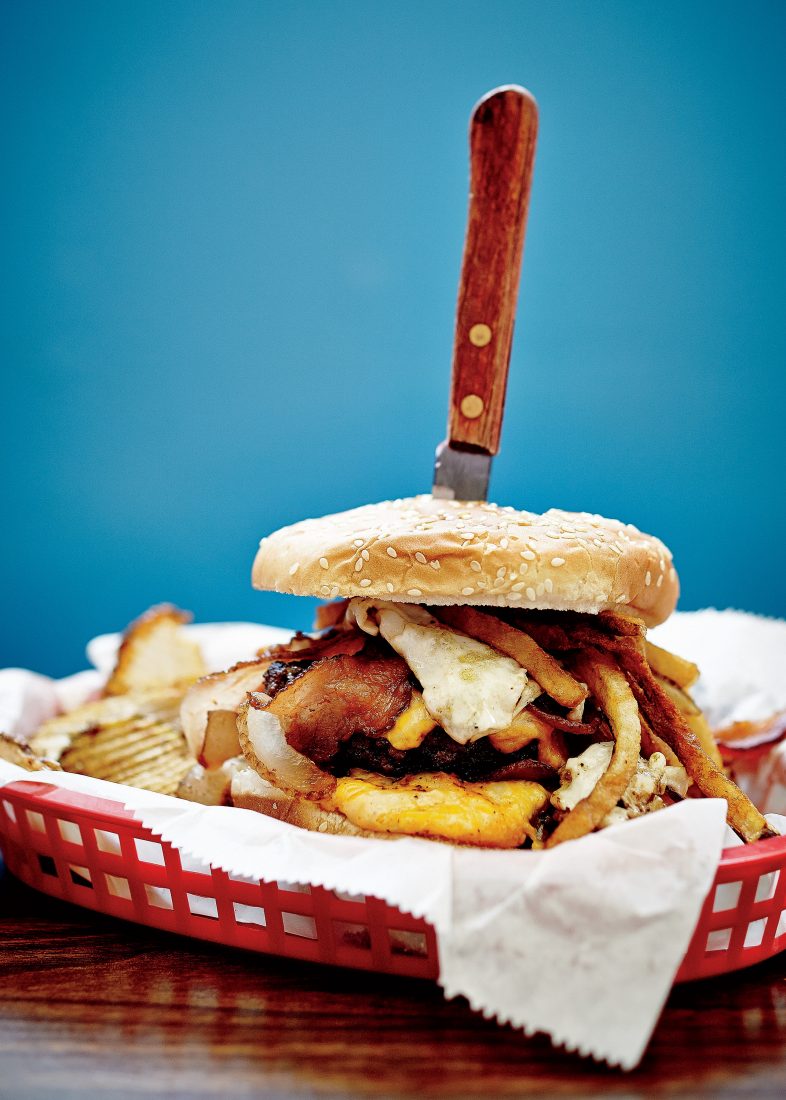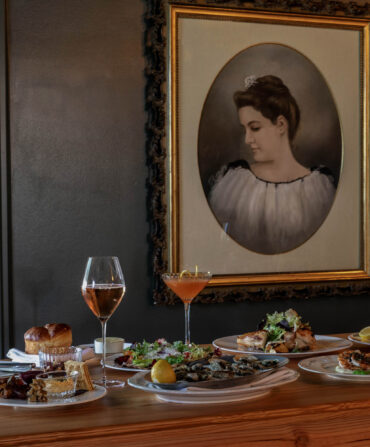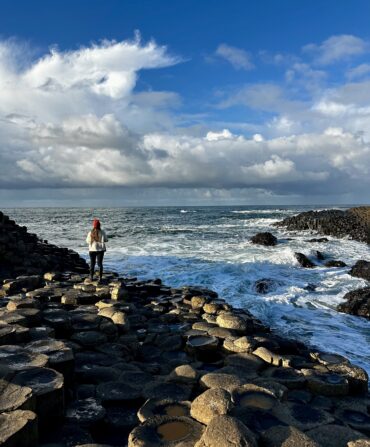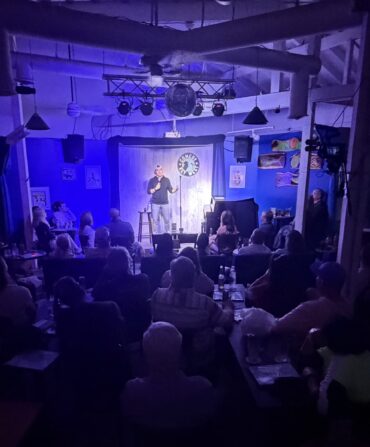Everyone’s heard about the Nu-Way Lounge & Restaurant’s Redneck Cheeseburger served with a secret-recipe pimento cheese atop the patty—it’s won awards, and been featured both in national print media and on television. Regulars know about the White Trash Burger with jalapeños, and the Trailer Park Burger on buttered toast. There’s the Blu-Way chicken sandwich, and the Nu-Wayler fish sandwich. There’s PBR, Miller, Bud, and then—for the more adventurous—Corona, Guinness, and Red Stripe. The wine list goes like this: “red, white, or pink.” It’s pretty well known that Nu-Way celebrated its seventy-fifth anniversary last year, on its original spot at 373 East Kennedy Street in downtown Spartanburg, South Carolina. There’s the red front door, a bar with a handful of tables running its length, a “dining room” to the side, and an outdoor patio behind the place protected by a wooden fence. There are a couple of old-fashioned pinball machines, and one of those bowling games.
So I don’t need to write about all that.
I had frequented Nu-Way six or eight times over a twenty-year period, back when I lived in Dacusville, South Carolina, some fifty miles away. At times I needed to come to Spartanburg for book signings or readings, and always I said, “Hey, can we go to Nu-Way, can we go to Nu-Way, can we go to Nu-Way?” which, perhaps, irritated my hosts in ways that New Yorkers understand when visitors plead to visit the Statue of Liberty or Charlestonians when it comes to Market Street and the Hunley submarine.
 Sometimes my hosts indulged me, but these were usually English department–type people, so there was no casual conversation at the bar. Instead the table talk concerned lesser-known short stories of William Faulkner, the postmodern musings of Jacques Derrida, tales of what someone said or did at the last writers’ conference. Other times someone in the group would blurt out, “I need a salad!” or “It’s too smoky in there!” or—even after Spartanburg banned smoking in restaurants and bars—“I can still smell smoke in there!”
Sometimes my hosts indulged me, but these were usually English department–type people, so there was no casual conversation at the bar. Instead the table talk concerned lesser-known short stories of William Faulkner, the postmodern musings of Jacques Derrida, tales of what someone said or did at the last writers’ conference. Other times someone in the group would blurt out, “I need a salad!” or “It’s too smoky in there!” or—even after Spartanburg banned smoking in restaurants and bars—“I can still smell smoke in there!”
As an aside, there are five salad options on the menu, from Classic House to Cobb. In between is the Classic Cheeseburger Salad.
Aside #2—people who “can still smell smoke in there” usually drive cars that emit toxic gases, and they need to move into a hole in the ground, or to Antarctica.
So. Last year I accepted a position in the English department at Wofford College, in Spartanburg. My better half, Glenda, and I bought a house in mid-March. I immediately started painting what would become my office—that’s another story that involves a jungle mural on the walls with giraffes, rhinos, lions, tigers, gorillas, Jesus, lemurs, a dachshund, fish, flora, Noah’s crashed ark on Mount Ararat, elephants, and an eagle on the ceiling—and then began moving books and books and books. My dog Dooley helped out as best he could, on weekends and late workday afternoons.
I said to Dooley one mid-afternoon Saturday, “Hey, let’s go to Nu-Way.”
We went. I parked, and put the windows two-thirds down for him, and went inside. I said to Becky, the owner who worked the grill on this particular day, “I want a Redneck burger, and I need a plain burger with nothing on it for my dog.”
She said, “Your dog’s outside?” I nodded. She said, “You got a leash? You can bring him in.”
I said, “Yeah, I do. How nice,” and got Dooley out of the Jeep.
I don’t want to get all existential and dog-whispering about this, but when I brought Dooley in I pretty much felt him saying, “Wow! Thanks. Can we play that bowling game?”

Photo: Johnny Autry
Nu-Way’s no-fuss interior.
Becky said, “I got a couple hot dogs, too, I’ll give him free.” Dooley sat down on the floor, on his best behavior. Soon thereafter he ate from my hand as thirteen-year-old dogs are wont to do. Again, not to get all anthropomorphic, but I could tell my dog wanted to say, “This is what everyone should be talking about when they mention Nu-Way.”
A half week went by. I needed help moving a 6,000-pound bookcase. I got this buddy of mine to drive over because he owed me. We’d moved an 8,000-pound bookcase of his the previous summer on a 105-degree day. My buddy had gone to seminary at Duke, which figures into this story. I said, “Hey, Mark, even though you didn’t offer me a sip of water last summer, let me take you to this place called the Nu-Way, on me,” et cetera.
He said, “Can I smoke a cigar in there?”
I said, “Sure,” lying, because I didn’t go to seminary.
I’ll admit that some of the story so far has been filled with hyperbole, but this part’s not:
The man behind the grill, Andrew, had just graduated from Duke seminary. He was a friend of Becky’s family, and she needed some help behind the grill. Andrew had come back home to work as a chaplain at one of the hospitals. I learned this information because I’ll talk to ants inhabiting the crack of a sidewalk, and I sat down saying to anyone who might listen, “Hey. I came in here Saturday with my dog. Becky fed him some free food. What’s your story?” and so on.
The man to the left of me said, “My daddy was a Hall of Fame basketball coach,” and I said, “Coach Red Myers?” and he said, “Yeah,” and I said, “I met your sister one time at a bar in Hodges called Jackson Station.”
Red Myers’s son was a pharmacist who went by Dubb. A man on the other side of Mark said, “I went to Wofford. This bar used to be different before they changed the drinking age from eighteen to twenty-one, back in 1986 or so.”
 Mark asked Andrew if Dr. So-and-So still taught at the seminary, and they might’ve started talking about Faulkner, Derrida, and various conferences involving Methodists. I looked around. A man named Andrew Blanchard said, “Welcome to Spartanburg, George,” from behind me at a table. We’d met in Oxford, Mississippi, nine years earlier, before he took a job in the art department at Converse College. A group of men and women sporting nice tattoos showed up soon thereafter. A lawyer came in talking about how he didn’t want another day like this one. Up by the door sat two white and two black men, laughing, pointing up at the TV. Somebody played the jukebox. Johnny Cash came on, followed by the Pogues.
Mark asked Andrew if Dr. So-and-So still taught at the seminary, and they might’ve started talking about Faulkner, Derrida, and various conferences involving Methodists. I looked around. A man named Andrew Blanchard said, “Welcome to Spartanburg, George,” from behind me at a table. We’d met in Oxford, Mississippi, nine years earlier, before he took a job in the art department at Converse College. A group of men and women sporting nice tattoos showed up soon thereafter. A lawyer came in talking about how he didn’t want another day like this one. Up by the door sat two white and two black men, laughing, pointing up at the TV. Somebody played the jukebox. Johnny Cash came on, followed by the Pogues.
No one sat mesmerized by a smartphone.
It’s that place. Nu-Way’s more about being a melting pot than it is a place for a patty melt.
Every idiot running for elected office has visited. But here’s what I like to think: During World War II some 200,000 enlistees entered Camp Croft—just four miles from Nu-Way—between 1941 and 1945. Remember, Nu-Way opened in 1938. Soldiers received weekend passes during their training exercises. Some of the more famous Camp Croft residents included actor Zero Mostel, Nixon’s buddy Henry Kissinger, Edward Koch, sports broadcaster Mel Allen, Nixon’s other buddy Spiro Agnew, Thomas Wolfe’s brother Fred, and the great short story writer John Cheever.
You know that one or more of them sat at the same bar top. Can you imagine the conversation between Agnew, Koch, and Mostel, with Mel Allen giving a play-by-play? Or Kissinger saying, “Let me try this pimento cheese everyone keeps talking about”?
Man. I love wondering if John Cheever sat inside this bar at some point, looking straight ahead, thinking, This place gives me ideas.








